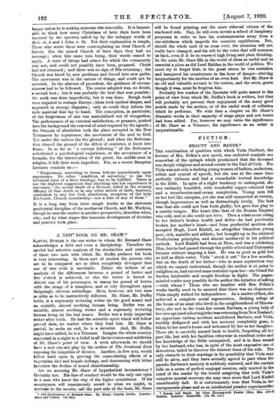A NEW BOOK ON MR. SHAW.*
SAmtTEL BUTLER is the one writer to whom Mr. Bernard Shaw acknowledges a debt and even a discipleship. Therefore the careful but selective analysis of the similarities and contrasts of these two men with which Mr. Puffin prefaces his book is very interesting. In these sort of studies the persons who are to be compared are so often completely divergent that one of two evils is inevitable. Either the tedium of an analysis of the differences between a pound of butter and five o'clock is achieved, or else the writer is forced to distort one of his personages, to stamp his pound of butter with the image of a timepiece, and so rely throughout upon fatiguingly obvious subterfuge. Here, however, are two men so alike as to be in.struetively different. Mr. Shaw, Mr. Duffin holds, is a supremely irritating writer (in the good sense) and an amiable, almost soothing human being. Butler was an amiable, almost soothing writer and a supremely irritating human being (in the bad sense). Butler was a truly impartial seeker after truth. He had the scientific spirit which will follow proved data, no matter where they lead him. Mr. Shaw is partial, he seeks an end, he is a moralist. And, Mr. Puffin might have added, he is a Trimmer. Imagine the whole country converted in a night to a belief Mall the inversions and subtleties of Mr. Shaw's point of view. A week afterwards we should have a new one-act play by the author of The Irrational Knot exposing the iniquities of divorce. Another, in five acts, would follow hard upon it, proving the emasculating effects of a vegetarian diet and female suffrage, and denouncing with bitter invective the decline of sound churchmanship
Are we accusing Mr. Shaw of hypothetical inconsistency ? Certainly not. His line of conduct would be the only one open to a man who knew the way of the higher consistency. If his countrymen will unanimously crowd to what we might, in contrast to the a.scetie, call the port side of the boat, Mr. Shaw
• The Quintessence of Bernard Shaw. By Henry Charles Duilln. London : /Wen and Unwln. [Cs. (Sd.1 will be found pointing out the more ethereal virtues of the starboard side. Nay, he will even invent a school of imaginary porpoises in order to lure his contemporaries away from a one-sidedness which imperils the common equilibrium. But, should the whole mob of us cross over, the situation will not really have changed, and his will be the voice that will summon us back, even if it be to renewed high living and plain thinking. In the main Mr. Shaw fills in the world of ideas as useful and as essential a place as did Lord Halifax in the world of politics. We must try to forget that, in the great storm he was mistaken and hampered his countrymen in the hour of danger—striving inopportunely for the niceties of an even keel. But Mr. Shaw is an old and valuable servant to the nation, and the error, grave though it was, must be forgiven him.
Probably few readers of the Spectator will quite assent to the point of view from which Mr. Puffin's book is written, but that will probably not prevent their enjoyment of the many good points made by the author, or of the useful work of collation which he performs. We wish that a chapter on Mr. Shaw's dramatic works in their capacity of stage-plays and not tracts had been added. For, however we may value the significance of Mr. Shaw as a Trimmer, his significance as an artist is unquestionable.


































 Previous page
Previous page